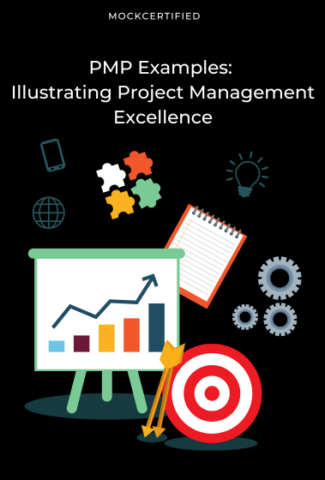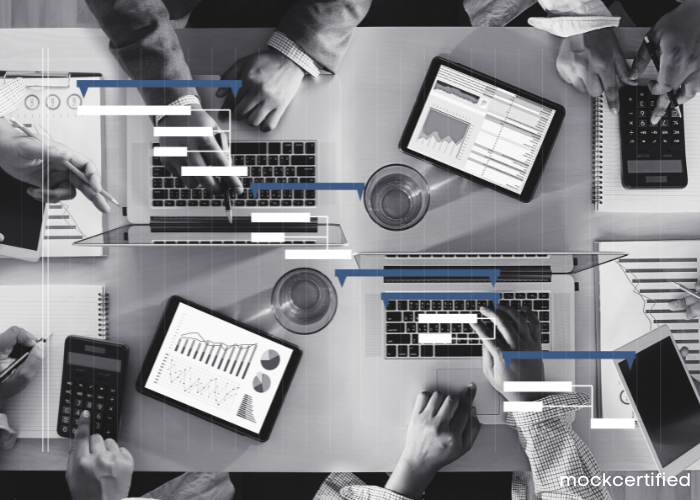
The Project Management Professional (PMP) certification is a worldwide recognized certificate that verifies a person’s project management ability.
PMP certification demonstrates proficiency in various aspects of project management, including initiating, planning, executing, monitoring, controlling, and closing projects.
To provide a better understanding of PMP in action, this article presents real-world PMP examples showcasing the application of project management principles and techniques.
Table of Contents
Introduction: PMP Certification and Its Significance
The Project Management Institute (PMI) offers PMP certification as a valued credential to individuals who complete the stringent standards and demonstrate their skill in project management.
Take the 200 MCQ-based PMP mock exam now for a cheap price!
It signifies a comprehensive understanding of project management principles and best practices, making certified individuals highly sought-after in the industry. Here are some PMP examples:
PMP Examples-
Example 1: Construction Project Management

2.1 Project Initiation
Construction Project management is one of the PMP examples.
In a construction project, the project manager utilizes their PMP knowledge to define project objectives, identify stakeholders, and assess project feasibility.
Project managers conduct a thorough analysis of the project requirements, budget constraints, and potential risks.
By applying PMP techniques, they create a project charter that outlines the project’s scope, objectives, deliverables, and key milestones.
2.2 Project Planning
During the planning phase, the project manager develops a detailed project plan that includes a work breakdown structure (WBS), a schedule, and a resource allocation plan.
In this, project managers role is to collaborate with architects, engineers, and other stakeholders to ensure alignment and obtain necessary approvals.
The project manager applies PMP principles to estimate costs, determine critical paths, and define quality standards.
2.3 Project Execution
Once the planning is complete, the project manager oversees the execution phase. They coordinate with subcontractors, suppliers, and the construction team to ensure smooth project implementation.
The project manager utilizes PMP techniques to manage resources, monitor progress, and address any issues that arise during construction.
2.4 Project Monitoring and Control
During the construction phase, the project manager closely monitors project performance using key performance indicators (KPIs) established during planning.
The project managers compare actual progress against the planned schedule and budget, ensuring adherence to quality standards and timely completion.
By applying PMP principles, the project manager identifies and mitigates risks, making necessary adjustments to keep the project on track.
2.5 Project Closure
In the final phase, the project manager applies PMP best practices to conduct a comprehensive project review. They assess project outcomes, gather feedback from stakeholders, and conduct a lessons learned session.
The project manager ensures that all project deliverables are completed and handed over to the client. They conduct a final project evaluation to measure the project’s success against predetermined criteria and objectives.
By following PMP guidelines, the project manager ensures a smooth project closure, including finalizing documentation, archiving project files, and conducting a formal project closure meeting.
Example 2: Software Development Project Management

Project Initiation
In software development projects, the project manager utilizes their PMP expertise to define project goals, identify stakeholders, and establish the project’s vision and scope.
Project managers in software development projects collaborate with clients and stakeholders to understand their requirements and develop a clear project charter.
The project manager applies PMP techniques to conduct feasibility studies, define project objectives, and create a project roadmap.
Project Planning
During the planning phase, the project manager creates a detailed project plan that includes defining project tasks, estimating effort, and allocating resources.
The managers apply PMP principles to develop a work breakdown structure (WBS), create a project schedule, and identify project risks.
The project manager collaborates with the development team to define milestones, set project deliverables, and establish quality assurance processes.
Project Execution
Once the planning is complete, the project manager oversees the execution phase of the software development project.
Mangers also coordinate with developers, testers, and other team members to ensure the timely completion of project tasks.
The project manager utilizes PMP techniques to track progress, manage risks, and maintain effective communication among team members and stakeholders.
Project Monitoring and Control
During the software development process, the project manager employs PMP practices to monitor project performance and ensure adherence to the project plan.
Their key role is to track key metrics, such as development progress, budget utilization, and quality assurance results.
The project manager conducts regular project status meetings, identifies any deviations from the plan, and takes corrective actions to keep the project on track.
Project Closure
In the final phase of the software development project, the project manager applies PMP principles to ensure a successful closure.
Their role is to conduct thorough testing and quality assurance checks to ensure the software meets the defined requirements.
The project manager facilitates user acceptance testing and coordinates the deployment and release of the software.
They also document lessons learned and conduct a project review to identify areas of improvement for future projects.
Example 3: Event Management Project Management

Project Initiation
Event management projects require effective project management to ensure successful execution. The project manager, equipped with PMP knowledge, starts by defining the event’s objectives, target audience, and scope.
Their role is to conduct market research, assess feasibility, and create a project charter that outlines the event’s vision, goals, and key stakeholders.
Project Planning
During the planning phase, the project manager utilizes PMP techniques to develop a comprehensive event plan.
They create a detailed timeline, allocate resources, and identify potential risks.
The project manager coordinates with vendors, venues, and suppliers to secure necessary arrangements and contracts.
They also create a contingency plan to address any unforeseen challenges that may arise during the event.
Project Execution
Once the planning is finalized, the project manager oversees the execution of the event.
They coordinate with the event team, including decorators, caterers, technicians, and other stakeholders, to ensure a seamless experience for attendees.
The project manager applies PMP principles to manage logistics, monitor progress, and resolve any issues that may occur during the event.
Project Monitoring and Control
During the event, the project manager employs PMP practices to monitor and control various aspects. They track the event’s budget, manage vendor contracts, and ensure adherence to the event timeline.
The project manager utilizes feedback mechanisms and surveys to gather participant feedback and assess the event’s success in meeting the desired objectives.
By employing PMP methodologies, they can identify any deviations from the plan and take corrective actions promptly.
Project Closure
Upon the event’s conclusion, the project manager focuses on the closure phase, ensuring that all necessary activities are completed.
They conduct a post-event evaluation, analyzing key metrics such as attendee satisfaction, budget utilization, and overall event impact.
The project manager documents lessons learned, including what worked well and areas for improvement. They also handle financial settlements, finalize contracts, and complete post-event reports.
Conclusion

PMP certification equips project managers with valuable skills and knowledge to effectively manage diverse projects.
Through real-world pmp examples in construction, software development, and event management, how PMP principles and techniques can be applied to ensure successful project outcomes.
By embracing the core principles of PMP and adapting them to specific project requirements, professionals can unlock their potential for project management excellence.



